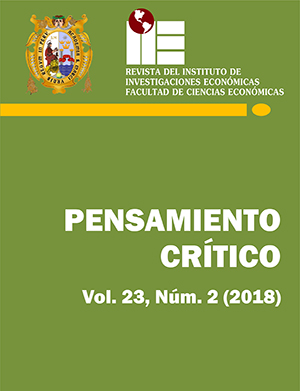Trade off between inflation and unemployment? The state as a direct employer
DOI:
https://doi.org/10.15381/pc.v23i2.15803Keywords:
Unemployment, Underemployment, Inflation, Role of theState, WelfareAbstract
In this paper it will be raised, contrary to what is suggested by the predominant orthodoxy in economic science, that the welfare of society improves not only controlling inflation but also and possibly more importantly, reducing unemployment. As will be seen, the objectives of reducing unemployment through direct state intervention using activist demand policies, as suggested by the Post Keynesian approach, would not accelerate inflation. Consequently, it would not be true as suggested by the analysis derived from the Phillips Curve, that reducing unemployment would necessarily increase inflation and that for this to not happen a certain NAIRU goal must be set (an unemployment rate that does not accelerate inflation). The approach that will be presented, in line with what is suggested by the Poskeynesian School, argues that the state can assume the role of “employer of last resort labor”. In this way, the state could directly hire unemployed labor (openly or disguised as informality), which constitutes a serious problem for developing economies.Downloads
Published
Issue
Section
License
Copyright (c) 2019 Jorge G. Osorio Vaccaro

This work is licensed under a Creative Commons Attribution-NonCommercial-ShareAlike 4.0 International License.
THE AUTHORS RETAIN THEIR RIGHTS:
a. The authors retain their trademark and patent rights, and also on any process or procedure described in the article.
b. The authors retain the right to share, copy, distribute, execute and publicly communicate the article published in Pensamiento Crítico (for example, place it in an institutional repository or publish it in a book), with recognition of its initial publication in Pensamiento Crítico.
c. The authors retain the right to make a subsequent publication of their work, to use the article or any part of it (for example: a compilation of their works, notes for conferences, thesis, or for a book), provided they indicate the source of publication (authors of the work, journal, volume, number and date).






